www.andyfilm.com
Message Board (open 24 hours!)
Twitter - @andredursin (for everything else!)
It’s another big month for 4K UHD enthusiasts, as multiple studios have launched a series of classics in the fledgling format. Most of these films need little introduction to fans, who are likely to wonder if they’re worth plunking down additional funds for the umpteenth time. With the new SUPERMAN 5-FILM COLLECTION 1978-87, the answer is – mostly yes – despite the fact there’s a major caveat involved with “Superman: The Movie,” the first of the Christopher Reeve “Man of Steel” adventures, and one very curious, and unintentional, music issue involving "Superman IV."
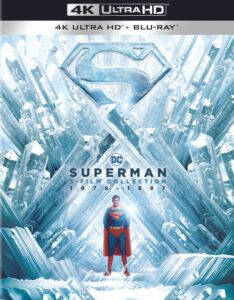 Warner’s box-set premieres SUPERMAN II, III, IV and the “Richard Donner Cut” of SUPERMAN II on 4K UHD for the first time – but also offers a lesser edition of SUPERMAN: THE MOVIE (143 mins., 1978, PG), which was first released in the format back in 2018. Warner’s box-set premieres SUPERMAN II, III, IV and the “Richard Donner Cut” of SUPERMAN II on 4K UHD for the first time – but also offers a lesser edition of SUPERMAN: THE MOVIE (143 mins., 1978, PG), which was first released in the format back in 2018.
That disc offered a Dolby Vision HDR presentation of the film with appreciably neutral colors (Krypton is gray as opposed to blue) compared to past releases, but its biggest asset was the first-ever, true restoration of the movie’s six-track 70mm sound mix. The old Dolby Stereo track — presented on laserdisc, DVD and Warner’s Blu-Ray box-set release of the theatrical cut – was often criticized for being too bright and unbalanced, with many, over the years, chalking up its inadequacies due to the early days of Dolby sound design.
The restored six-track mix – housed in the 2018 UHD’s default 5.1 Dolby Digital track –was a revelation for fans. Discrete effects were audible in the rear channels throughout; dialogue was clearer, while the general balance between music/dialogue/effects was substantially improved. The entire track also boasted less of an “echo-plex” effect than the familiar two-channel mix, making for an audio upgrade as substantial as the transfer itself, one that adhered more closely to director Richard Donner and cinematographer Geoffrey Unsworth’s intended visual design. Details are appreciably enhanced in certain portions, while other segments retain Unsworth’s trademark glossiness. The colors, as well, appeared more satisfyingly balanced and HDR usage, while not breathtaking, is effective throughout (compare the richness of the Smallville sequences to the prior Blu-Rays, just for starters).
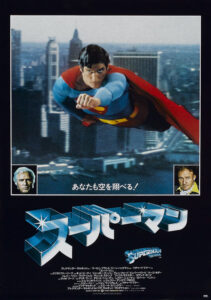
Copyright HAG ?2009
Regrettably, the 4K UHD offered here is precisely the same disc as the 2018 release with one exception – that 5.1 track is gone! In its place is the same, old Dolby Stereo mix (2.0 DTS MA) from the Blu-Ray, DVD, etc., that’s comparatively limp and lifeless by comparison. It’s a baffling choice that was made as die-hard fans – even if they are going to buy this box set – will want to hang onto the 2018 pressing for the inclusion of that terrific 70mm track (the overpowered, “revisionist” Dolby Atmos track with a hyper-active LFE channel has, of course, also been carried over).
Luckily the rest of this box-set manages to be satisfying with one or two strange elements that, admittedly, may not be an issue for most, while fans will recognize the corresponding Blu-Ray platters as matching their prior “Superman Anthology” BD counterparts, as they contain the same transfers and extras (commentaries, the 1987 Superman Anniversary TV special, deleted scenes, Making Of documentaries, etc.). Note that box contained a special features disc sporting the excellent Kevin Burns doc “Look! Up in the Sky: The Amazing Story of Superman” which is not included here, nor is the “Special Edition” edit of “Superman: The Movie” and its corresponding extra features.
The big difference here are the 4K UHD editions for the sequels which include new Dolby Atmos mixes (taking the place of 5.1 tracks), original 2.0 sound mixes, and HDR10 enhanced new 4K transfers that are, far and away, the main reason to invest in this set. Here’s a breakdown:
SUPERMAN II 4K UHD (127 mins., 1981, PG) / SUPERMAN II: THE RICHARD DONNER CUT 4K UHD (116 mins., 2006, PG): What does one say when you waited a good portion of your life to see a legendary unreleased film – only disappointed with the result?
Back in the late ‘90s Universal rectified one of their studio’s wrongs by restoring director Ridley Scott’s original version of his 1985 fantasy “Legend.” While the “new” film was still far from perfect, most viewers agreed that Scott’s movie functioned far more effectively in its intended form, with Jerry Goldsmith’s glorious music backing the spectacular visual trappings of the film better than the U.S.-edited version with Tangerine Dream’s new age rock soundtrack.
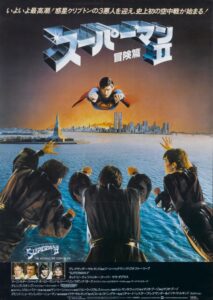 “Superman II,” meanwhile, offered a different predicament than merely restoring a completed, albeit unreleased, film: director Richard Donner finished “Superman: The Movie” and shot a substantial amount of footage for its sequel…but was fired before his version was completed. In a move that fans continue to debate and argue over, director Richard Lester (who worked as an uncredited “liaison” between Donner and the Salkinds on the first film) took the reigns of the follow up and his SUPERMAN II (“the real one” in my mind) became a huge smash worldwide in 1981 — meeting with near-unanimous critical approval (Roger Ebert compared it with “The Godfather: Part II” as one of the few follow-ups to improve on its predecessor) and big box-office grosses. “Superman II,” meanwhile, offered a different predicament than merely restoring a completed, albeit unreleased, film: director Richard Donner finished “Superman: The Movie” and shot a substantial amount of footage for its sequel…but was fired before his version was completed. In a move that fans continue to debate and argue over, director Richard Lester (who worked as an uncredited “liaison” between Donner and the Salkinds on the first film) took the reigns of the follow up and his SUPERMAN II (“the real one” in my mind) became a huge smash worldwide in 1981 — meeting with near-unanimous critical approval (Roger Ebert compared it with “The Godfather: Part II” as one of the few follow-ups to improve on its predecessor) and big box-office grosses.
As the years progressed, however, Donner’s firing became something of a rallying cry among fans — especially on the internet, where message boards inquired for years about seeing Donner’s version of “Superman II” released. It didn’t matter that Donner never completed his film — making a true “Donner Cut” virtually impossible to construct in the first place — or that Lester’s movie was excellent to begin with: certain fans, over time, have come to associate anything positive about the “Superman” franchise with Donner, and anything remotely negative with Lester.
However, some of them had to begrudgingly acknowledge that maybe that narrative wasn’t entirely accurate after Warner and editor Michael Thau performed as major a restoration as one could hope for with SUPERMAN II: THE RICHARD DONNER CUT, which was assembled and released on home video right after Thanksgiving in 2006.
Though a fascinating curiosity for any Superman fan, this strange compilation of Donner footage (from his incomplete version), Lester fragments (from the theatrical cut), outtakes, screen tests, new special effects, and tracked music from John Williams’ original “Superman” score proves to be anything but a satisfying viewing experience when taken on its own terms.
Since a good amount of the released “Superman II” originated from Donner’s footage in the first place (any scene with Gene Hackman’s Lex Luthor, for example, was shot by Donner), it may be surprising to some that this shorter version isn’t all that different from the Lester theatrical cut, and is noteworthy for what it doesn’t include so much as what it does.
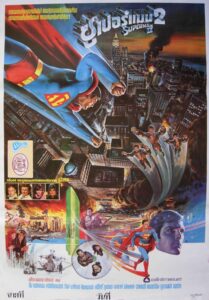 In addition to more Gene Hackman (in sequences that were included in ABC’s TV broadcasts of the film during the 1980s), Donner’s version offers a totally different opening scene. Gone is the entire Eiffel Tower sequence, and in its place is an outtake wherein Lois tries to expose Clark as Superman by jumping out the window of the Daily Planet. It’s a cute sequence, but it doesn’t work as effectively as Lester’s version where Lois attempts — at Niagara Falls — to prove that Kent is the Man of Steel by throwing herself into the chilly depths. After seeing the two versions, the Donner sequence just seems a bit more outlandish. In addition to more Gene Hackman (in sequences that were included in ABC’s TV broadcasts of the film during the 1980s), Donner’s version offers a totally different opening scene. Gone is the entire Eiffel Tower sequence, and in its place is an outtake wherein Lois tries to expose Clark as Superman by jumping out the window of the Daily Planet. It’s a cute sequence, but it doesn’t work as effectively as Lester’s version where Lois attempts — at Niagara Falls — to prove that Kent is the Man of Steel by throwing herself into the chilly depths. After seeing the two versions, the Donner sequence just seems a bit more outlandish.
More surprising, though, is that the “Donner Cut” lacks the heart and soul of the theatrical “Superman II.” Some viewers have forgotten entirely that the finished “Superman II” offers a satisfying and moving love story between Lois and Clark, where Lois’ discovery of Clark’s hidden identity plays with a generous amount of poignancy and tenderness.
Here, all that remains of the Donner/Tom Mankiewicz version of that sequence is screen test footage of Christopher Reeve and Margot Kidder in their roles, set against a bare-bones backdrop — and through no fault of their own, their early, “preliminary” performances fail totally to match the drama and emotion of the Lester-filmed version. The way in which the sequence is also presented here — with a quick cut to the Phantom Zone villains’ arrival in Texas, with no fall out from that pivotal moment — further amplifies the problem: there’s no genuine emotion instilled in the viewer because what you’re watching is rough, incomplete, and compromised. For that reason alone, it’s virtually impossible to take “The Donner Cut” seriously from a dramatic standpoint (I also found Lois a lot more manic and cartoonish in this version as well, jumping out the window of the Daily Planet and pulling a gun on Clark in what borders on a psychotic obsession with proving he’s Superman! Though it’s clear Donner wanted this to be more playful than what Lester shot, it’s also sillier and less dramatic).
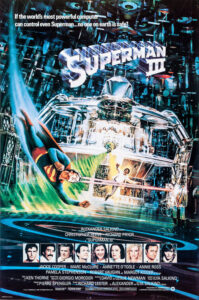 Since footage was used from a variety of sources, it’s understandable that there’s no cohesion in the presentation — something likewise amplified by the tracked music cues from John Williams’ original “Superman: The Movie” score. Say what you will about Ken Thorne’s “Superman II” soundtrack with its reduced orchestra and diminished arrangements, at least Thorne’s music fit the sequences it was intended to accompany. Here, we get the same repetitive motifs used over and over, further removing the viewer from the film’s universe and making one aware that “The Donner Cut” is essentially an expensive attempt at mixing outtakes with elements from exterior sources. Since footage was used from a variety of sources, it’s understandable that there’s no cohesion in the presentation — something likewise amplified by the tracked music cues from John Williams’ original “Superman: The Movie” score. Say what you will about Ken Thorne’s “Superman II” soundtrack with its reduced orchestra and diminished arrangements, at least Thorne’s music fit the sequences it was intended to accompany. Here, we get the same repetitive motifs used over and over, further removing the viewer from the film’s universe and making one aware that “The Donner Cut” is essentially an expensive attempt at mixing outtakes with elements from exterior sources.
Where “The Donner Cut” does prove fascinating is in its “new” Marlon Brando sequences. Brando had appeared as Superman’s father, Jor-El, in the original “Superman” but a contractual split meant that Richard Lester had to re-shoot his “Superman II” scenes, substituting Susannah York (as Kal-El’s mother) for Brando. Brando’s sequences were never seen before and were here restored to the movie for the first time. However, with one exception (the pivotal moment where a now-human Clark regains his powers), the sequences are leaden and, surprisingly, inferior to Christopher Reeve’s scenes with York in the completed “Superman II” – watching Superman have a conversation about Lois just seems to make more sense when it’s with his Mom anyway.
Another major issue is the film’s ending, which offers the same resolution as “Superman: The Movie” (the “turn back the Earth” finale) but retains the comical coda where Clark returns to the diner to beat up the obnoxious trucker…which now makes no sense at all since that original confrontation never occurred in the first place!
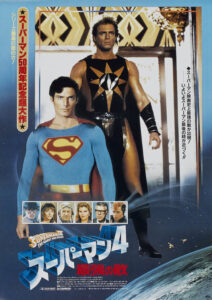
All that said (and sorry to ramble on!), the 4K UHD of “The Donner Cut” is still worthwhile viewing for any fan of “Superman II,” and this new 4K master offers a superlative UHD (2.39) presentation with HDR10 grading that surpasses the UHD of “Superman: The Movie” – even the sequences shared between them. “Superman II” itself also looks smashing on UHD, with a wider dynamic range than the “Superman” 1 presentation and both Dolby Atmos (which sounds like an upmix of the 5.1 Blu-Ray track and isn’t a “revisionist” mix with new effects) and 2.0 tracks to boot. What can I say? I’m happy with the theatrical version, and will always maintain it’s the superior presentation of the picture.
SUPERMAN III 4K UHD (123 mins., 1983, PG) / SUPERMAN IV: THE QUEST FOR PEACE 4K UHD (89 mins., 1987, PG): One of the things that’s long irked me about modern Super-Hero Cinema is that their respective plots seldom reflect the type of stories I used to read in Marvel and DC titles back in the ‘80s. Nearly every movie seems to end with some wild, apocalyptic climax of endless special effects that drone on and on, with Earth’s safety usually hanging in the balance – yet most comic books I grew up with offered more grounded stories of villains trying to get their way, though seldom with the universe’s fate up in the air. After all, what sense would it make for every villain to want to want to kill off the population? Lex Luthor typically wanted to control the world – not completely destroy it.
 “Superman III” is like something you’d read in a Man of Steel comic back then, with a megalomaniac rich guy (Robert Vaughn) wanting to take control of the world’s weather in order to manipulate global markets to his own advantage. Sounds like something more grounded in reality than an intergalactic demon running amok, and this genial, underrated sequel – while an obvious and admitted comedown from the first two Alexander Salkind productions – is still a lot of fun. Not so much because of Richard Pryor’s participation as a regular guy who becomes a hacker for Vaughn, but its mix of storylines which also involve Lana Lang (a lovely Annette O’Toole), Clark’s Smallville reunion, and Superman’s run-in with Kryptonite which splits his soul literally in two. These all enable Christopher Reeve to give a terrific performance as a drunken “bad Superman” as well as play to his comedic talents in a movie that still manages to retain the solid production values of the first two films, plus a Ken Thorne score unshackled from merely rehashing John Williams’ classic music from the first picture. “Superman III” is like something you’d read in a Man of Steel comic back then, with a megalomaniac rich guy (Robert Vaughn) wanting to take control of the world’s weather in order to manipulate global markets to his own advantage. Sounds like something more grounded in reality than an intergalactic demon running amok, and this genial, underrated sequel – while an obvious and admitted comedown from the first two Alexander Salkind productions – is still a lot of fun. Not so much because of Richard Pryor’s participation as a regular guy who becomes a hacker for Vaughn, but its mix of storylines which also involve Lana Lang (a lovely Annette O’Toole), Clark’s Smallville reunion, and Superman’s run-in with Kryptonite which splits his soul literally in two. These all enable Christopher Reeve to give a terrific performance as a drunken “bad Superman” as well as play to his comedic talents in a movie that still manages to retain the solid production values of the first two films, plus a Ken Thorne score unshackled from merely rehashing John Williams’ classic music from the first picture.
That’s not the case, obviously, with “Superman IV,” a terribly misconceived sequel that brought back Reeve – also credited with the movie’s well-meaning if insipid plot line – for one last go-around. Sadly, good intentions quickly were washed away by The Cannon Group’s shoddy production and financial woes, which resulted in some lousy special effects and a chunk of the movie being tossed in the editing room. That being said, you can’t blame distributor Warner Bros. for refusing to rescue the movie in post-production (judging from the deleted scenes, with their horrendous, abandoned “Nuclear Man 1” plotline, not even an influx of cash to improve the FX was going to help). The studio ended up moving up IV’s intended Christmas ‘87 release – where it was meant to mark Superman’s 50th Anniversary – to August instead, where it deservedly died in the Summer Dumping Grounds.
Both movies premiere on UHD here and the HDR10 enhanced transfers, while running a little “hot” at times in terms of their use of high dynamic range, are superlative, nicely framed with strong color and deep blacks. III’s Atmos mix is just fine and faithful to its original sound design, while packing a lot more bass than the original 2.0 track (also on-hand here). Things go a little haywire on IV, however, since its new Atmos soundtrack includes a handful of alternate performances – including an early recording of the main title where the orchestra didn’t have its act together! One could say this only enhances the film’s camp value, though, and for anyone who wants to hear the original mix, it’s present and accounted for via the disc’s 2.0 DTS MA track.
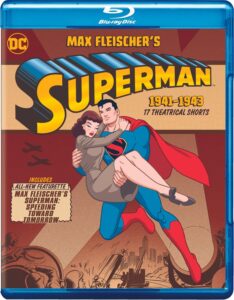 Digital HD codes are included for all five pictures, making this a not quite super yet still solid UHD box-set all told. Note Amazon is also selling a 4K UHD limited-edition Steelbook set with gorgeous theatrical artwork and a few fun bonus goodies. Digital HD codes are included for all five pictures, making this a not quite super yet still solid UHD box-set all told. Note Amazon is also selling a 4K UHD limited-edition Steelbook set with gorgeous theatrical artwork and a few fun bonus goodies.
Newly available next week is the long-awaited, true high-definition remastering of MAX FLEISCHER’S SUPERMAN 1941-43 (146 mins.; Warner), the original animated shorts that brought the Man of Steel to life in full, eye-bursting color. Beautifully designed and told, these shorts have long been subjected to poor home video treatment in the public domain along with Warner’s respectable collection of them, both on DVD and in the Blu-Ray “Superman Anthology” – albeit sadly in standard-def transfers.
While the UHD/Blu-Ray box above once again contains these shorts in standard-definition, this standalone, single-disc Warner Blu-Ray includes all 17 Max Fleischer Superman shorts in legit 1080p AVC encodes (1.37, DTS MA 2.0) and the results are solid in terms of detail but the big problem is compression: encoded at a low bit-rate, there are times you can see issues in transitions between dissolves especially. The mono sound is robust with three featurettes looking at the Fleischer series, their legacy and enduring historical value — it’s just unfortunate the bit-rate is shockingly starved for a single-disc BD-50 release like this (with under 2.5 hours of content, it shouldn’t have been an issue).
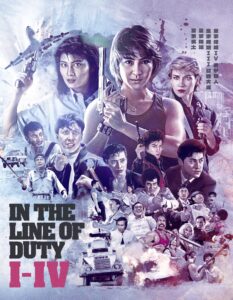 88 Films New Releases 88 Films New Releases
88 Films has been on a tear so far this year, bringing Hong Kong cinema fans one deluxe edition after another for a couple of Jackie Chan’s best (“Supercop” [aka “Police Story 3”], “Dragons Forever”), and now they tackle a female-centric series of films in another great Blu-Ray box – even if the series itself really doesn’t hang together as a confined “franchise” by most standards.
Out May 16th from 88 is IN THE LINE OF DUTY I-IV, which offer two of Michelle Yeoh’s earliest starring roles, followed by a pair of follow-us with Cynthia Khan as an intrepid police inspector along a similar vein. Each film has been restored in 2K with tons of extra features – here’s a breakdown:
ROYAL WARRIORS (96 mins., 1986) offers Yeoh as a cop who works with a Japanese agent (Hiroyuki Sananda) and a security guard (Michael Wong) as they take on a terrorist who plots revenge after they thwart an airplane hijacking. Yeoh is back in a similar role in YES, MADAM (93 mins., 1985), apparently released afterwards but shot before “Royal Warriors,” playing a police inspector teamed with a Scotland Yard investigator (Cynthia Rothrock) in a case revolving around the death of a British witness who held evidence against an HK crime syndicate.
With Yeoh married and choosing what would be a short-lived retirement, Cynthia Khan took over the series’ lead in IN THE LINE OF DUTY III (84 mins., 1988) as a rookie cop out to stop Japanese thieves who pull off a deadly jewelry heist. She’s then teamed with Donnie Yen in IN THE LINE OF DUTY IV (95 mins., 1989) as mismatched cops assigned to nab international drug smugglers who have connections buried inside their own department.
You can safely detect the central formula at play in these films but the action is usually fun and the chemistry between the leads palpable – especially by the time you get to the entertaining fourth film. Even better, the over-the-top execution on the part of directors like Corey Yuen means the plots are kept to a minimum (as are the running times), and the accent is all on fisticuffs, shootouts and chases, which these four films each deliver in their own, indelibly ‘80s HK way.
Fans of the genre should love 88’s presentation here, all four movies looking good in new 2K (1.85) restorations with 2.0 Cantonese audio, English “classic dub” tracks, commentaries featuring Frank Dejng and more. You also get “Export” versions on II and IV; select-scene commentary on “Yes, Madam” with Djeng and Cynthia Rothrock; archive interviews with Michelle Yeoh and Donnie Yen; trailers; and an archival commentary from HK historian Stefan Hammond and actor Michael Wong on IV. It’s all capped by a 100-page booklet in one of 88’s sturdy hardbound cases with a mini-fold-out poster – a great addition to a phenomenal slate of 2023 releases from the label already this year.
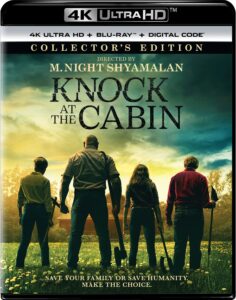 Also New & Noteworthy Also New & Noteworthy
ALL QUIET ON THE WESTERN FRONT Blu-Ray (147 mins., 2022, R; Capelight/MPI): New adaptation of the Remarque classic is technically solid in its depiction of trench warfare and the waning days of WWI, as seen through the prism of a young, ultimately doomed, German soldier (Felix Kammerer). There’s no denying the material’s resonant themes and irony, though some of the poetry is absent in director Edward Berger’s movie, which departs from its source in sequences showing the Germans ultimately signing the Armistice with French leaders — adding some historical context that also deviates from having the story delivered by a single narrator. The end result comes off as a little underwhelming in the face of “1917,” which raised the bar for the genre with its cinematic approach, while the Volker Bertelmann score is alternately ineffective or outright obnoxious with a three-note motif announcing itself like a sound effect gone wrong at a pro sporting event.
Capelight and MPI’s standalone Blu-Ray release (I reviewed the 4K UHD/BD back in March) offers the same Dolby Atmos soundtrack as its UHD, just with a SDR, 1080p (2.39) transfer. For extras, Berger provides a commentary while a 20-minute Making Of is included along with trailers.
KNOCK AT THE CABIN 4K Ultra HD/Blu-Ray (100 mins., 2023, R: Universal): Limp, overstated apocalyptic thriller from director M. Night Shyamalan, who adapting Paul Tremblay’s book for a study of two parents (Jonathan Groff, Ben Aldridge) who are forced to make a tragic choice in regards to their young daughter after a quartet of strangers take them hostage in a secluded cabin. Dave Bautista relays a convincing portrayal of menace in a movie that’s mostly a lot of talk, asking “provocative questions” but failing – like so many of Shyamalan’s films – to provide a satisfying resolution. Even Shyamalan’s last picture, “Old,” managed to score better at the box-office. Universal’s 4K UHD (2.39) of “Knock at the Cabin” debuts this week, the disc sporting Dolby Atmos sound, a Dolby Vision HDR transfer, deleted scenes, featurettes, the Blu-Ray and a Digital HD code.
 MIAMI VICE Limited Edition Steelbook Blu-Ray (140/133 mins., 2006, Unrated/R; Mill Creek): Michael Mann’s odd updating of his groundbreaking ‘80s TV series shares almost nothing in common with its predecessor outside of its title, creator, and lead character names. Crockett and Tubbs are here embodied by Colin Farrell (continuing his streak of box-office poison) and Jamie Foxx, respectively, who get wrapped up in Miami drug trafficking during their investigation of two federal agent killings. Good-looking cinematography is off-set somewhat by a meandering script that’s never as compelling as it ought to be; still, “Miami Vice” is watchable enough, especially its theatrical version which debuts on Blu-Ray this month as part of Mill Creek’s limited-edition Steelbook. This collectible package, exclusive to Walmart, offers both the superior theatrical edit of the movie along with Mann’s slightly less focused Director’s Cut in 1080p (2.40) transfers with 5.1 DTS MA audio, Mann’s Unrated cut commentary, and several featurettes. MIAMI VICE Limited Edition Steelbook Blu-Ray (140/133 mins., 2006, Unrated/R; Mill Creek): Michael Mann’s odd updating of his groundbreaking ‘80s TV series shares almost nothing in common with its predecessor outside of its title, creator, and lead character names. Crockett and Tubbs are here embodied by Colin Farrell (continuing his streak of box-office poison) and Jamie Foxx, respectively, who get wrapped up in Miami drug trafficking during their investigation of two federal agent killings. Good-looking cinematography is off-set somewhat by a meandering script that’s never as compelling as it ought to be; still, “Miami Vice” is watchable enough, especially its theatrical version which debuts on Blu-Ray this month as part of Mill Creek’s limited-edition Steelbook. This collectible package, exclusive to Walmart, offers both the superior theatrical edit of the movie along with Mann’s slightly less focused Director’s Cut in 1080p (2.40) transfers with 5.1 DTS MA audio, Mann’s Unrated cut commentary, and several featurettes.
Another Walmart Steelbook exclusive is due out May 23rd: V/H/S/99 (109 mins., 2022; RLJE), the latest entry in the now long-running horror anthology set in the analog home video era. This effort from directors Maggie Levin, Johannes Roberts, Flying Lotus, Tyler MacIntyre and Joseph & Vanessa Winter offers more of the same entertainment for genre addicts with gory stories, camp humor, and just enough retro-home video nostalgia that here takes viewers back to the waning days of VHS before DVD took over. RLJE’s Blu-Ray (1.78, 5.1 DTS MA) includes a NY Comic Con panel, commentary track, deleted scenes, bloopers, featurettes and plenty more supplements, all housed in an attractive Steelbook package for horror fanatics.
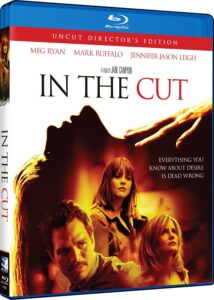 IN THE CUT Blu-Ray (119 mins., 2003, Unrated; Mill Creek): Grimy “sensual thriller” stars mousy Meg Ryan as a wallflower who’s looking to break out of her sexual slump. Meanwhile, just as a series of murders plague New York, Ryan engages in an affair with cop Mark Ruffalo, while all signs point to someone around Ryan as the murderer — possiblyRuffalo, her ex-lover Kevin Bacon, or maybe herself!! IN THE CUT Blu-Ray (119 mins., 2003, Unrated; Mill Creek): Grimy “sensual thriller” stars mousy Meg Ryan as a wallflower who’s looking to break out of her sexual slump. Meanwhile, just as a series of murders plague New York, Ryan engages in an affair with cop Mark Ruffalo, while all signs point to someone around Ryan as the murderer — possiblyRuffalo, her ex-lover Kevin Bacon, or maybe herself!!
Jane Campion’s career as a filmmaker has been a hit-or-miss affair, and “In the Cut” — based on a novel by Susanna Moore — definitely fits into the “miss” category. This is an ugly and poorly scripted mystery-thriller filled with depressing characters that tries so desperately hard to be “edgy” and “provocative” it misfires totally on the dramatic level. Ryan seems at a loss to project any nuances in her role aside from the many “realistic” sex scenes, while Campion and cinematographer Dion Beebe accentuate the “dark underside” of New York in a movie that ultimately is neither provocative or satisfying on any kind of aesthetic or dramatic level. I assume Campion took the reigns of “In the Cut” so she could make a commercial thriller (Nicole Kidman is also one of the producers), yet despite her pedigree having made pictures like “The Piano,” she proves here that she’s no more successful in the genre than your typical Hollywood hack.
Mill Creek’s Blu-Ray (1.85, 2.0 DTS MA) represents the standalone release of the movie in the format, as the label previously issued it as part of a double-feature package with the similarly poor Charlize Theron thriller “Trapped” a decade ago. The disc lacks the DVD’s extra features (commentary, featurette, etc.)
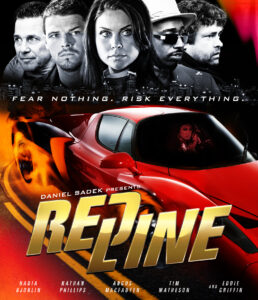 Quick Takes Quick Takes
SHANGHAI JOE Blu-Ray (98 mins., 1973; Cauldron): Wild spaghetti western variant with a Japanese flair sends Myoshin Hayakawa’s Chin Hao to the U.S., hoping to make a go of it in the new land – only to run afoul of racists and other bad guys, including a ranch owner exploiting Mexican farmers. What sets apart Mario Caiano’s genre affair is its melding of western cliches with kung fu elements, resulting in a wild action scenes with heavy R-rated violence – but what else can you expect from a movie co-starring Klaus Kinski? This wild and woolly B-movie includes a 1080p (2.35) transfer with English and Italian audio; a commentary by Mike Hauss; interview with Master Mikuriya; a featurette; trailer and image gallery.
Also new from Cauldron is CONVOY BUSTERS (100 mins., 1978), an Italian import featuring Maurizio Merli as a tough cop, demoted from rank, who’s transferred to a quiet town in order to avoid the press, only to find smugglers are using the area for their own nefarious purposes. Fans of Italy’s ‘70s crime dramas should be excited by this Stelvio Massi-helmed outing, sporting a solid Stelvio Cipriani score, and new to Blu-Ray from Cauldron. The disc sports an attractive 2K restoration (1.85) from the original negative with a slew of new and archival extras, including an interview with Merli and Danilo Massi, plus commentary by Mike Malloy and Mike Martinez.
Also New From MVD: NOON WINE DVD (59 mins., 1966; Liberation Hall) is the Sam Peckinpah-helmed TV movie about a struggling Texas couple (Jason Robards, Olivia De Havilland) who welcomes a Swedish worker (Per Oscarsson) to their rural farm where he helps Robards’ family turn their fortunes around – only to later find out their new worker has fled from a mental institution. Tragedy ensues. Liberation Hall’s DVD includes the entire “ABC Stage 67” original broadcast, with commercials, plus a commercial-free rendition in a 4:3 transfer culled from the UCLA Library Film & TV Archive…the auto racer REDLINE (95 mins., 2007, PG-13) provides a low-rent knockoff of “Fast and the Furious” with stars Nathan Phillips, Nadia Bjorlin, Angus MacFadyen (did anyone’s career really fall as sharply as this “Braveheart” vet?), Tim Matheson and Eddie Griffin trying to maintain interest. MVD’s Blu-Ray includes a 1080p transfer, 5.1 sound and two archival featurettes.
 JESUS REVOLUTION Blu-Ray (120 mins., 2023, PG-13; Lionsgate): Surprise box-office hit adapts the Ellen Santilli Vaughn-Greg Laurie ‘70s book about Laurie, a young man (played here by Joel Courtney) whose search for meaning leads him to a street preacher (Jonathan Roumie), Pastor Chuck Smith (Kelsey Grammer) and a subsequent, grassroots-driven revival of Smith’s church. Jon Erwin and Brent McCorkle’s well-executed movie is entertaining for what it is and scored big at the box-office with faith-based viewers. Lionsgate’s Blu-Ray offers Dolby Atmos audio, a 2.39 transfer, commentary, format exclusive featurettes, the DVD and a Digital code. JESUS REVOLUTION Blu-Ray (120 mins., 2023, PG-13; Lionsgate): Surprise box-office hit adapts the Ellen Santilli Vaughn-Greg Laurie ‘70s book about Laurie, a young man (played here by Joel Courtney) whose search for meaning leads him to a street preacher (Jonathan Roumie), Pastor Chuck Smith (Kelsey Grammer) and a subsequent, grassroots-driven revival of Smith’s church. Jon Erwin and Brent McCorkle’s well-executed movie is entertaining for what it is and scored big at the box-office with faith-based viewers. Lionsgate’s Blu-Ray offers Dolby Atmos audio, a 2.39 transfer, commentary, format exclusive featurettes, the DVD and a Digital code.
TRANSFUSION Blu-Ray (106 mins., 2023, R; Lionsgate): Sam Worthington essays a former elite soldier forced to head into the criminal underworld in order to turn around the fortunes of both him and his teen son, who’s become involved in drugs. Natt Nable’s movie is something of a drab affair but the film does, at least, takes its time developing its characters which, if you stick with it, do lead to a satisfying conclusion. Lionsgate’s Blu-Ray (2.39, 5.1 DTS MA) is now available sporting a Digital HD copy...RIGHTEOUS THIEVES (92 mins., 2023, R) is something of a low-budget “Mission Impossible” wherein a group of art thieves attempt to recover priceless works stolen during WWII by the Nazis and still under the control of a neo-Nazi billionaire. Lisa Dival stars in Anthony Nardolillo’s film, now on Blu-Ray (2.39, 5.1 DTS MA) from Lionsgate sporting a featurette and Digital HD copy.
NEXT TIME: New Warner Archive and Vinegar Syndrome titles! Until then, don’t forget to drop in on the official Aisle Seat Message Boards and direct any emails to our email address. Cheers everyone!
|














 Warner’s box-set premieres SUPERMAN II, III, IV and the “Richard Donner Cut” of SUPERMAN II on 4K UHD for the first time – but also offers a lesser edition of
Warner’s box-set premieres SUPERMAN II, III, IV and the “Richard Donner Cut” of SUPERMAN II on 4K UHD for the first time – but also offers a lesser edition of 
 “Superman II,” meanwhile, offered a different predicament than merely restoring a completed, albeit unreleased, film: director Richard Donner finished “Superman: The Movie” and shot a substantial amount of footage for its sequel…but was fired before his version was completed. In a move that fans continue to debate and argue over, director Richard Lester (who worked as an uncredited “liaison” between Donner and the Salkinds on the first film) took the reigns of the follow up and his
“Superman II,” meanwhile, offered a different predicament than merely restoring a completed, albeit unreleased, film: director Richard Donner finished “Superman: The Movie” and shot a substantial amount of footage for its sequel…but was fired before his version was completed. In a move that fans continue to debate and argue over, director Richard Lester (who worked as an uncredited “liaison” between Donner and the Salkinds on the first film) took the reigns of the follow up and his  In addition to more Gene Hackman (in sequences that were included in ABC’s TV broadcasts of the film during the 1980s), Donner’s version offers a totally different opening scene. Gone is the entire Eiffel Tower sequence, and in its place is an outtake wherein Lois tries to expose Clark as Superman by jumping out the window of the Daily Planet. It’s a cute sequence, but it doesn’t work as effectively as Lester’s version where Lois attempts — at Niagara Falls — to prove that Kent is the Man of Steel by throwing herself into the chilly depths. After seeing the two versions, the Donner sequence just seems a bit more outlandish.
In addition to more Gene Hackman (in sequences that were included in ABC’s TV broadcasts of the film during the 1980s), Donner’s version offers a totally different opening scene. Gone is the entire Eiffel Tower sequence, and in its place is an outtake wherein Lois tries to expose Clark as Superman by jumping out the window of the Daily Planet. It’s a cute sequence, but it doesn’t work as effectively as Lester’s version where Lois attempts — at Niagara Falls — to prove that Kent is the Man of Steel by throwing herself into the chilly depths. After seeing the two versions, the Donner sequence just seems a bit more outlandish. Since footage was used from a variety of sources, it’s understandable that there’s no cohesion in the presentation — something likewise amplified by the tracked music cues from John Williams’ original “Superman: The Movie” score. Say what you will about Ken Thorne’s “Superman II” soundtrack with its reduced orchestra and diminished arrangements, at least Thorne’s music fit the sequences it was intended to accompany. Here, we get the same repetitive motifs used over and over, further removing the viewer from the film’s universe and making one aware that “The Donner Cut” is essentially an expensive attempt at mixing outtakes with elements from exterior sources.
Since footage was used from a variety of sources, it’s understandable that there’s no cohesion in the presentation — something likewise amplified by the tracked music cues from John Williams’ original “Superman: The Movie” score. Say what you will about Ken Thorne’s “Superman II” soundtrack with its reduced orchestra and diminished arrangements, at least Thorne’s music fit the sequences it was intended to accompany. Here, we get the same repetitive motifs used over and over, further removing the viewer from the film’s universe and making one aware that “The Donner Cut” is essentially an expensive attempt at mixing outtakes with elements from exterior sources.
 “Superman III” is like something you’d read in a Man of Steel comic back then, with a megalomaniac rich guy (Robert Vaughn) wanting to take control of the world’s weather in order to manipulate global markets to his own advantage. Sounds like something more grounded in reality than an intergalactic demon running amok, and this genial, underrated sequel – while an obvious and admitted comedown from the first two Alexander Salkind productions – is still a lot of fun. Not so much because of Richard Pryor’s participation as a regular guy who becomes a hacker for Vaughn, but its mix of storylines which also involve Lana Lang (a lovely Annette O’Toole), Clark’s Smallville reunion, and Superman’s run-in with Kryptonite which splits his soul literally in two. These all enable Christopher Reeve to give a terrific performance as a drunken “bad Superman” as well as play to his comedic talents in a movie that still manages to retain the solid production values of the first two films, plus a Ken Thorne score unshackled from merely rehashing John Williams’ classic music from the first picture.
“Superman III” is like something you’d read in a Man of Steel comic back then, with a megalomaniac rich guy (Robert Vaughn) wanting to take control of the world’s weather in order to manipulate global markets to his own advantage. Sounds like something more grounded in reality than an intergalactic demon running amok, and this genial, underrated sequel – while an obvious and admitted comedown from the first two Alexander Salkind productions – is still a lot of fun. Not so much because of Richard Pryor’s participation as a regular guy who becomes a hacker for Vaughn, but its mix of storylines which also involve Lana Lang (a lovely Annette O’Toole), Clark’s Smallville reunion, and Superman’s run-in with Kryptonite which splits his soul literally in two. These all enable Christopher Reeve to give a terrific performance as a drunken “bad Superman” as well as play to his comedic talents in a movie that still manages to retain the solid production values of the first two films, plus a Ken Thorne score unshackled from merely rehashing John Williams’ classic music from the first picture. Digital HD codes are included for all five pictures, making this a not quite super yet still solid UHD box-set all told. Note Amazon is also selling a
Digital HD codes are included for all five pictures, making this a not quite super yet still solid UHD box-set all told. Note Amazon is also selling a  88 Films New Releases
88 Films New Releases Also New & Noteworthy
Also New & Noteworthy MIAMI VICE Limited Edition Steelbook Blu-Ray (140/133 mins., 2006, Unrated/R; Mill Creek):
MIAMI VICE Limited Edition Steelbook Blu-Ray (140/133 mins., 2006, Unrated/R; Mill Creek): IN THE CUT
IN THE CUT  Quick Takes
Quick Takes JESUS REVOLUTION Blu-Ray (120 mins., 2023, PG-13; Lionsgate):
JESUS REVOLUTION Blu-Ray (120 mins., 2023, PG-13; Lionsgate):
